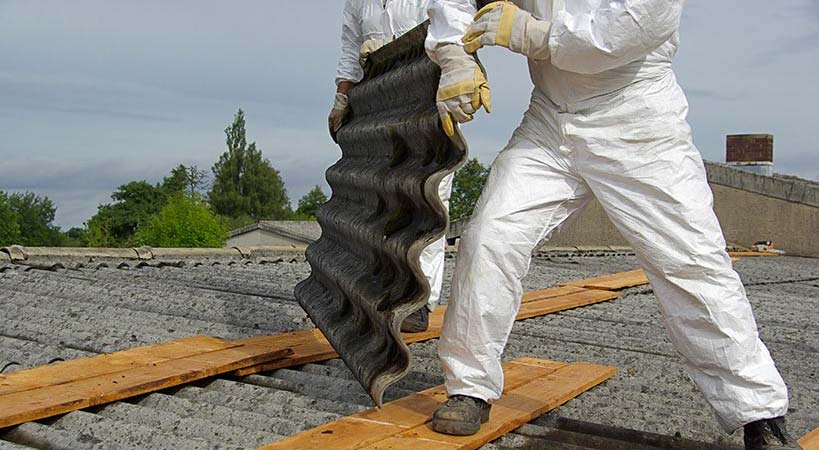Need to Remove or Refurbish Asbestos?
Asbestos Refurbishment & Demolition Surveys
At Crucial Environmental, we provide asbestos refurbishment and demolition surveys, also called R&D surveys and previously known as Type 3 surveys, to clients UK-wide, from our offices in the South East, Midlands and South West. We are accredited to BS EN ISO/IEC 17020 by UKAS to undertake Refurbishment & Demolition Asbestos Surveys (previously known as Type 3) as well as Asbestos Management Surveys (previously known as type 2), in accordance with the current HSE guidelines.
If you’re planning on carrying out any refurbishment or demolition work, either on a residential or commercial property, you’ll need an asbestos refurbishment and demolition survey. The purpose of this type of survey is to determine whether any asbestos-containing materials (ACMs) may be present in the fabric of the building which could release harmful fibres should the ACMs be disturbed during refurbishment or demolition of all or part of a building. Released fibres could then be inhaled into the lungs, possibly leading to a potentially lethal disease.
An asbestos survey like this may be particularly necessary if any maintenance or repair work is being conducted at a home or other site which was built before 1999, while the use of deadly asbestos was still legal across the construction industry.
So if you’re looking to conduct any refurb or demolition works and need to have an R&D survey for asbestos, get in touch with the team today
Why Choose Crucial Environmental for
Refurbishment & Demolition Surveys
Nationwide Coverage
Rapid Response Times
Fast Formal Quotations
Highly Competitive Rates
Fully Experienced Team
Residential, Commercial & Industrial
What Does An R&D Survey Involve?
A survey of this nature does incorporate rather more intrusive working methods than, for example, a management survey.
That’s because ACMs may be entirely hidden within a particular structure. And the firm doing the survey will need to get to these potentially harmful materials to take a sample. What’s more, the destructive nature of an R&D survey means that workers may themselves disturb some ACMs, which in turn means that all buildings must be vacated before the survey can begin. Then, before anyone can be allowed back inside, you need to check that they are safe for people to return, i.e. they must be certified as being ‘fit for reoccupation’.
We use fairly destructive and intrusive methods to access hard-to-reach areas like roof voids, wall interiors, solid floors and undercrofts.
Before starting work, we’ll do a live asbestos risk assessment
Our post-survey report will sum up what we found, and provide detailed guidance on any action needed
You can also combine a management survey with an R&D survey for the areas of a site where you need the latter.
When Is An R&D Survey Necessary?
You will need an R&D survey when refurbishing or developing all or part of a building.
Some examples include:
- Replacement of a very old boiler or other plant
- Removing Artex ceiling
- Demolition of an old garage which may contain asbestos roof panels
- Replacement of older insulating material
- When you are demolishing a building or part of a building or structure, to make way for a new construction or development
- When you are demolishing or knocking through part of a building so that you can complete renovation works
What Is The Purpose Of An Asbestos Refurbishment & Demolition Survey?
Essentially, there are two key aims to any R&D survey. These are to ensure that:
- No one will be harmed by work on ACMs in the premises, or any associated plant or equipment
- The right contractor will complete the refurbishment or demolition in the right way
Explore the Benefits of
Asbestos Refurbishment & Demolition Surveys by Crucial Environmental
UKAS Accreditation: Crucial Environmental is accredited to BS EN ISO/IEC 17020 by UKAS, ensuring that all Refurbishment & Demolition (R&D) surveys are conducted to the highest industry standards in line with current HSE guidelines.
Comprehensive Survey Methodology: The R&D surveys use intrusive and destructive methods to access hard-to-reach areas, such as roof voids, wall interiors, and solid floors, ensuring that no asbestos-containing materials (ACMs) are missed.
Safety Assurance: The team conducts a live asbestos risk assessment before starting any survey work, ensuring that all necessary precautions are taken to protect workers and future occupants of the property.
Clear and Detailed Reporting: Post-survey reports provide a clear summary of findings, detailed guidance on any required actions, and recommendations to ensure that refurbishment or demolition work is carried out safely and effectively.
Experience Across Multiple Property Types: Whether it’s residential or commercial properties, Crucial Environmental offers expertise in conducting R&D surveys across a wide range of building types and scenarios, including older properties where asbestos is more likely to be present.
Compliance with Legal Requirements: Ensures that you meet all legal obligations by identifying any ACMs that could be disturbed during refurbishment or demolition, preventing the release of harmful asbestos fibres.
Comprehensive Service Options: Offers the ability to combine an asbestos management survey with an R&D survey, providing a tailored and thorough asbestos assessment for all areas of your site, saving time and ensuring full compliance.
Discover some of our other
Asbestos Survey, Removal & Consultancy Services
Licensed vs. Non-Licensed Asbestos Removal: A Comprehensive Guide
Asbestos removal is categorised into licensed and non-licensed work depending on the risk level, the type of asbestos-containing material (ACM), and the extent of potential fibre release. These classifications determine the legal obligations, training requirements, and safety measures that must be followed to ensure compliance with the Control of...
Are Asbestos Surveys Mandatory in 2025?
Do You Need an Asbestos Survey? If you own, manage, or are responsible for a property built before 2000, you may be legally required to have an asbestos survey carried out. Asbestos-containing materials (ACMs) were widely used in construction until their ban in 1999, making surveys essential for safety and legal compliance. This article answers...
Is Artex Hiding Danger in Your Home?
Artex was a staple of home decor in the 1960s to 1980s, prized for its textured aesthetic. But beneath its decorative charm could lie a hidden danger: asbestos. This guide will help you understand the risks, legal responsibilities, and safe handling practices for Artex in your home. The Hidden Risk of Asbestos in Artex Artex was often mixed with...
Get More Information
About Refurbishment & Demolition Surveys with our FAQ’s and Articles
Could my property contain asbestos?
If your property was built before the year 2000, it is possible that it may contain asbestos. While the use of asbestos was made illegal by regulations in 1999, it had been a material that was commonly used in building and construction. You should not assume that because asbestos is currently banned that it cannot be in your property.
Why should I get an asbestos survey?
If you are a homeowner and you suspect you have asbestos on the property, you are not required by law to have a plan in place. However, many homeowners naturally want to be aware of the existence of the material so that they can take steps to protect themselves and anyone living there from exposure.
Are there different types of asbestos survey?
If you are planning to have work carried out on your property or you are having the entire building demolished and are worried about disturbing asbestos or ACMs, you should opt for an asbestos refurbishment and demolition survey. This survey will use invasive and destructive techniques to establish the extent of asbestos within the fabric of the property.
If you are buying a property and are worried about the potential for asbestos, you should choose a home buyer asbestos survey. This will look into the asbestos and ACMs in the property that you are considering purchasing so that you can make an informed choice.
Where could I find asbestos in my property?
Who is responsible for asbestos in commercial buildings?
Is asbestos dangerous?
How can I identify asbestos?
If I have asbestos, do I need to remove it?
No. Many commercial property or home owners believe that if they have asbestos on their property, the best thing to do is to remove it, but this isn’t the case at all. In fact if the asbestos is in good condition, it’s usually much safer to leave it in place and ensure that it is not disturbed. Your asbestos survey will guide you as to whether you need to have the asbestos removed.

Common Asbestos Questions
Getting your facts right about asbestos is vital. However, doing so can be a lot easier said than done, largely due to how difficult asbestos is to identify.
As such, it’s important to arm yourself with the knowledge you need to understand how to deal with asbestos should you ever encounter it, and get to know why it can cause such a big problem.
Get in touch today to take control of your Asbestos needs
Southern Office
01903 297818
Email Us
hello@crucial-enviro.co.uk
Visit our contact page to view all of our offices and contact methods



